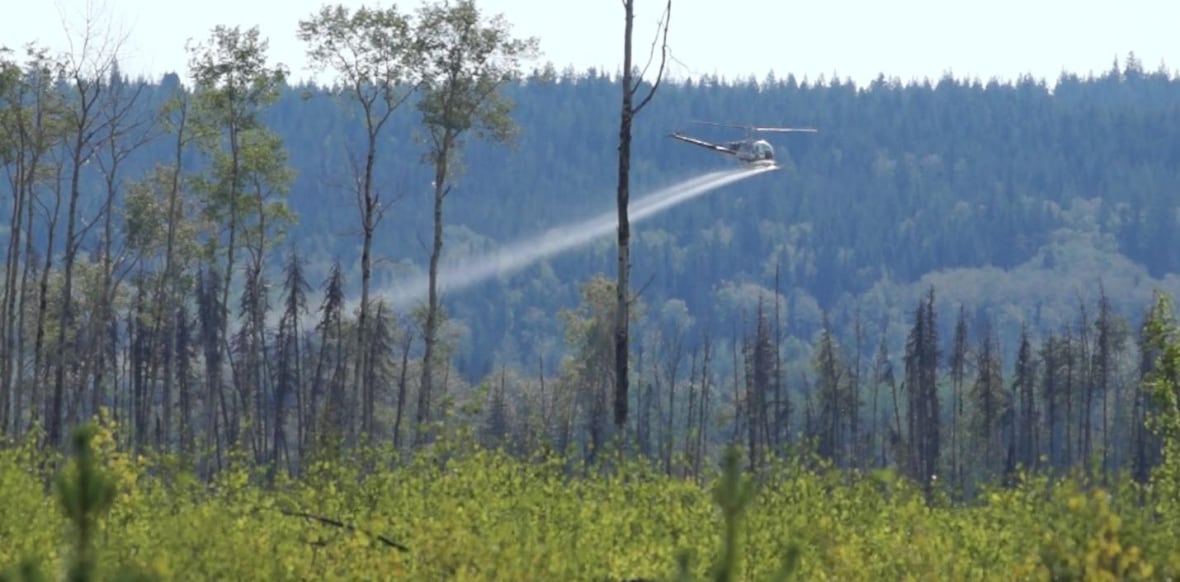The forestry company Interfor has cancelled plans to spray herbicides that contain the chemical glyphosate on forests along the north shore of Lake Huron.
“For 2025, Interfor has chosen not to proceed with an herbicide application in the Pineland, Spanish and Northshore forests,” said Andrew Horahan, Interfor’s executive vice-president of Canadian operations, in a statement to CBC News.
Horahan, however, did not explain why the company cancelled plans to use herbicides in that part of northeastern Ontario.
“We remain confident in the safety and efficacy of regulated herbicide use as part of responsible and sustainable forestry management,” Horahan said.
“Looking ahead, we will continue to employ herbicide as necessary, and base our decisions on the best available science, regulatory guidance, and our ongoing engagement with stakeholders.”
 Forestry companies use helicopters and other aircraft to spray herbicides on Crown land they harvest. The goal is to kill plants that compete with the trees they harvest. (James Steidle/CBC)
Forestry companies use helicopters and other aircraft to spray herbicides on Crown land they harvest. The goal is to kill plants that compete with the trees they harvest. (James Steidle/CBC)
In late summer, forestry companies spray thousands of hectares of northern Ontario Crown land with glyphosate to kill plants that would otherwise compete with the trees they harvest, such as jack pine.
Glyphosate works by interfering with amino acid synthesis in plants, and is used to kill weeds and broadleaf vegetation.
On Aug. 14, around 100 people participated in a rally in Serpent River First Nation, located along the north shore of Lake Huron, to oppose aerial spraying of herbicides in the area.
Health Canada last reviewed glyphosate in 2017. At that time it concluded “the levels of glyphosate to which people living in Canada may be exposed do not cause any harmful effects when glyphosate-containing products are used properly according to product label instructions.”
Health Canada’s assessment also goes on to say that “overexposure to glyphosate products may lead to skin and eye irritation, nausea and vomiting, and respiratory effects such as nose irritation and asthma in workers and others, if label directions are not followed.”
But environmental groups— including Friends of the Earth Canada, the David Suzuki Foundation, Safe Food Matters and Environmental Defence Canada — have launched a court challenge of Health Canada’s conclusions on glyphosate.
They argue the federal department’s reassessment is based on outdated science. The International Agency for Research on Cancer, for example, says that glyphosate is “probably carcinogenic to humans.”
Brent Niganobe, the chief of Mississauga First Nation, said he was happy to hear Interfor would not spraying trees in their territory this summer.
“In the reading between the lines they said for this year, so hopefully, you know, this is a practice going forward that it does stop,” he said.
“There’s other ways to go about it that are maybe a cost, but those should be considered, considering the impacts on the environment that it can have.”
In Québec, the use of herbicides containing glyphosate on Crown land has been banned since 2001.
Other methods to manage forests include manually weeding plants by hand, or with machinery, and controlled burns.
Niganobe said Interfor hasn’t explained to him why it will not spray the north shore forests this year.
